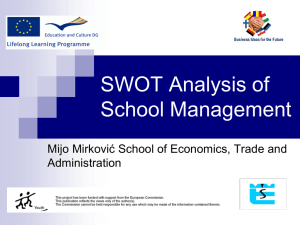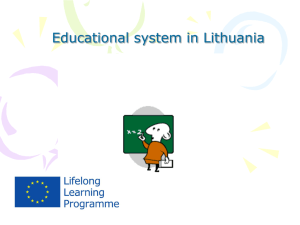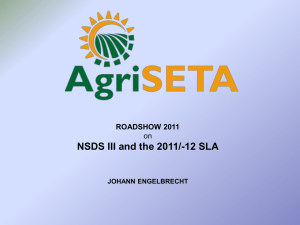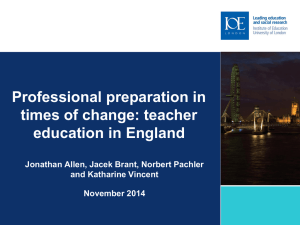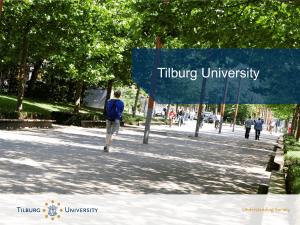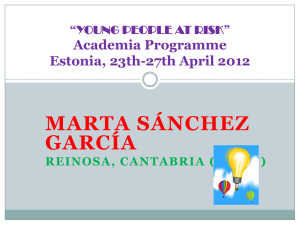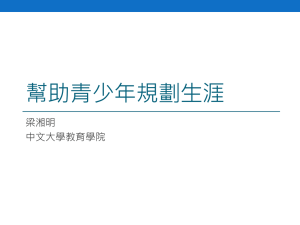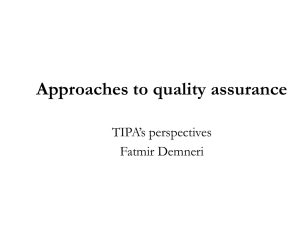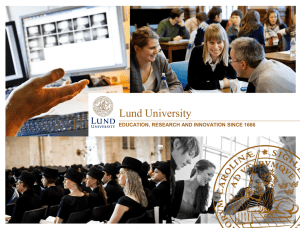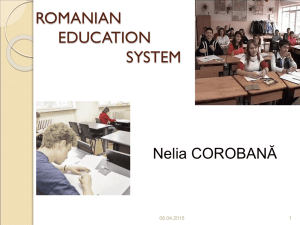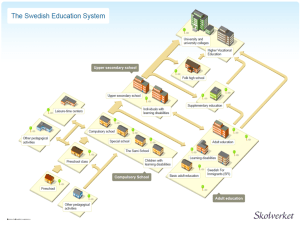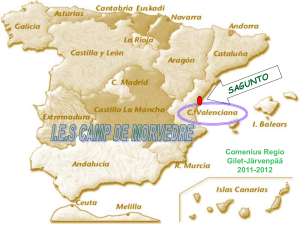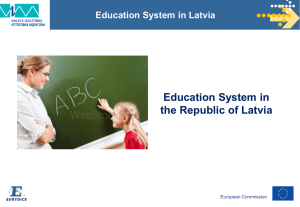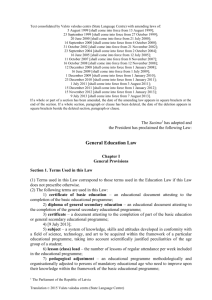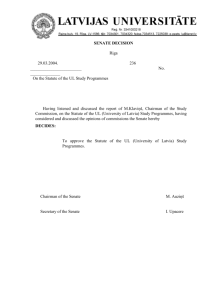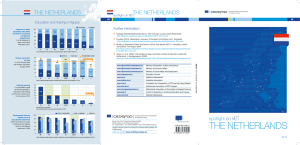General secondary education
advertisement
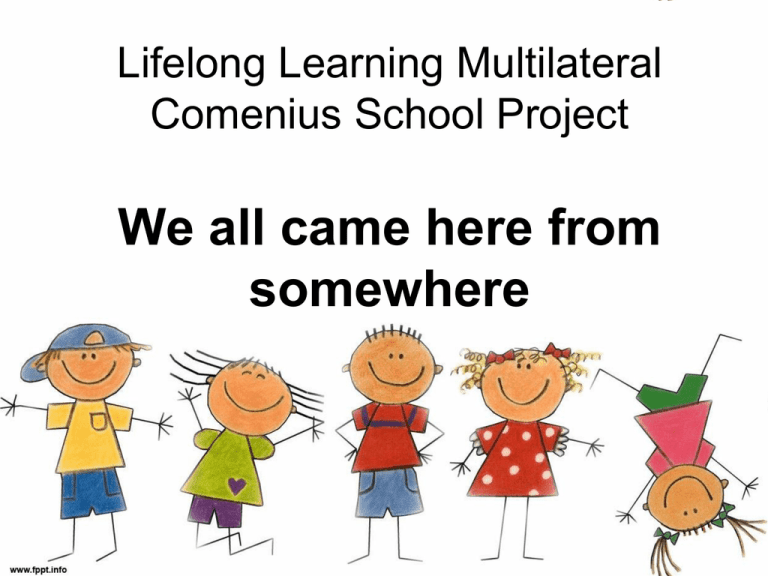
Lifelong Learning Multilateral Comenius School Project We all came here from somewhere Education system in Latvia Governance of the Education System • Education system is administered at three levels: - national, - municipal, - institutional. • The Parliament (Saeima), the Cabinet of Ministers and the Ministry of Education and Science are the main decision-making bodies at a national level. • The Ministry of Education and Science is the education policy-making institution. • It also issues the licenses for opening comprehensive education institutions and sets educational standards. Education System in Latvia • It is divided into several levels and types: – – – – – – – – Pre-school education, Basic education, Special needs education, Vocation oriented education, Secondary education, Higher education, Post graduate education, Adult education. Pre-school education • It is for children aged 2-6 • From 5-6 pre-school education is compulsary to everyone. • Children aged 5-6 have to attend either kindergarten or any general educational establishment that provides pre-school programmes. Basic education • It is compulsory from 7-16 (18). • The curriculum is determined by the national basic education standard. • The Ministry of Education and Science supervises and determines the content of the final national examinations. Basic education • Pupils receive a Certificate of the basic education and a statement of records. • That gives them an admission for further education and training in secondary level educational programmes. • The certificate of the basic education can receive only those students who have received evaluation in all compulsory school subjects, national tests and examinations. Special needs education • It provides education for children with special needs. • The education depends on their individual health condition. Vocation oriented education Vocation oriented education in arts and music is voluntary and provides for a person’s individual educational needs and wishes. Secondary education There are two types of secondary education programmes: • general secondary, • vocational secondary education and training programmes. General secondary education • The compulsory curriculum of 3-year general secondary school is determined by the National Standard in the following profiles: - general comprehensive, - humanitarian / social, - mathematics / natural science / technical, - vocational / professional (arts, music, business, sports). General secondary education • All educational programmes must contain 8 compulsory and 3-6 selected subjects according to the profile. • Schools can offer some optional subjects that take no more than 10-15% of the total study time. • At the end of the third year all students have to take 4 centralized national examinations, the content and procedure of which are determined by the Ministry of Education and Science and approved by the Cabinet of Ministers. General secondary education • All students, who have received a positive assessment (4 – 10) in all subjects according to the chosen profile and the national examinations and a certificate of the passed centralized exams got a Certificate of the secondary education. • A Certificate of the secondary education provides the right to continue education in any higher-level education programme. General secondary education • If the student has not received an evaluation in one or more subjects or national examination, he/she receives a school report. • A school report does not provide the right to continue education in any higher-level education programme. Vocational education and training programmes • Different vocational education and training programmes are developed and offered for all branches of the national economy of Latvia. • Majority vocational education schools in Latvia provide 4 and 3 year vocational education and training programmes. • Only some programmes are designed for the basic vocational education and training purposes. Higher education There are two kinds of higher education in Latvia: • Academic higher education, • Professional higher education. Academic higher education • Programmes are based upon fundamental and applied science. • Passing exams and development of Bachelor’s or Master’s Paper are integral part of the academic higher education. • Duration of Bachelor’s studies may be 3-4 years. Master’s degree is awared after at least 5 years studies. Professional higher education There are two levels of professional higher education: • The first level of professional higher education or college education (2-3 years). • The second level of professional higher education leading to a professional Bachelor’s degree that can be followed by further 1-2 years of professional Master’s studies. Postgraduate education • Master’s degree is required for admission to doctoral studies (Ph.D.). • Doctoral studies last 3-4 full-time years. • They include advanced studies of the subject in a relevant study programme and a scientific research towards doctoral thesis. • The Council of Science appoints Promotion Council and sets the procedures for award of Doctor’s degrees. Tuition fee • The tuition at pre-school, basic and secondary education in a state or municipality founded educational establishments is funded from the national or municipal budget. • Private educational institutions set a tuition fee for providing education. • In higher education programmes the state covers tuition fees for a certain number of students’ places, others have to pay. Grading system Educational achievements are assessed in a ten-point system: 10 with distinction (izcili), 9 excellent (teicami), 8 very good (ļoti labi), 7 good (labi), 6 almost good (gandrīz labi), 5 satisfactory (viduvēji), 4 almost satisfactory (gandrīz viduvēji), 3 weak (vāji), 2 very weak (ļoti vāji), 1 very very weak (ļoti,ļoti vāji). Adult education • It includes all types of formal, non-formal and informal education including further and interest education, professional upgrading and in-service training. • It is provided to satisfy needs in lifelong education process to support personal development and competitiveness in the labour market regardless of person’s age and previous education. Education in Olaine Educational institutions • • • • 2 secondary schools 5 kindergartens (1 private) Music and art school Mechanical and technological college Olaine Secondary School No 1 with a structural unit Olaine Elementary School • Subordinated to Olaine Region Council • Students – 817 • Teachers – 75 • Technical staff – 34 Programmes • Pre-school programme(5-6) compulsory • Basic education programme (7-15) compulsory • Basic education programme for minorities (7-10) • Comprehensive general secondary education programme (16-19) without particularly emphasised subjects • Hobby education programme A school year • • • • • usually from 1 September to 31 May 35 weeks long (grades 2-8, 10-11) 34 weeks long (grade 1) 34 weeks long + 4 weeks for exams(grade 9) 34 weeks long + 5 weeks for exams(grade 12) Hobby education: • • • • • • • • • Folk dance Vocal ensembles Newspaper The first aid ABC Book’s design Theatre Self-expression creativity Astronomy Sports (basketball, volleyball, floorball, mountain climbing) Thank you for attention! Have a great time in Latvia! http://izm.izm.gov.lv/education.html
